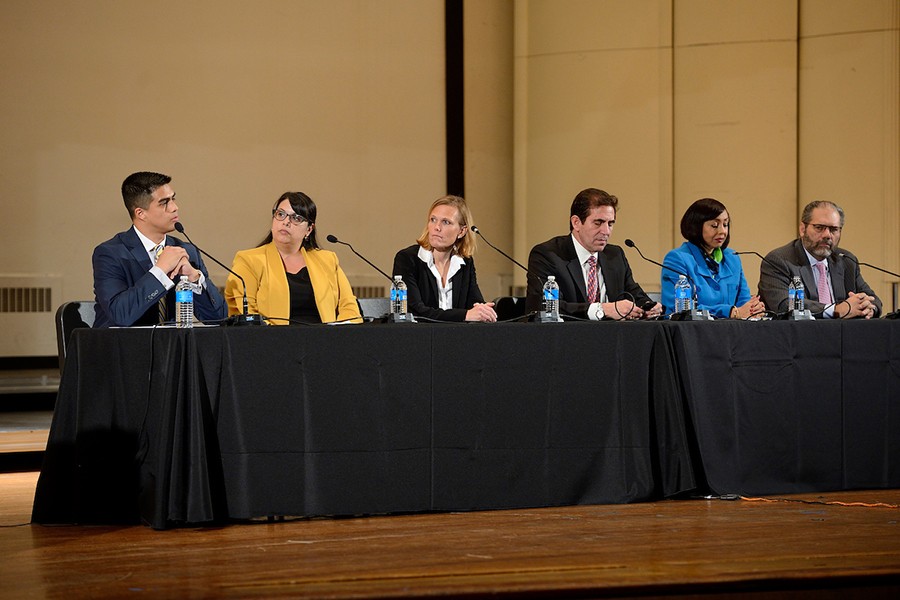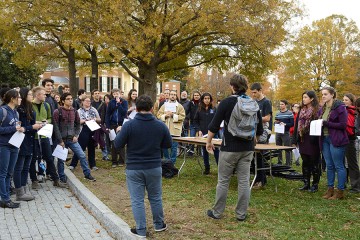How are Latinos in America feeling after the election?
A panel of professionals who serve Latino populations convened last night at Johns Hopkins University to probe that question, along with the broader questions of the ambiguous yet united Latino identity.
The panelists—four from Johns Hopkins, along with journalist Ray Suarez and marketing CEO Javier von Westphalen,—unilaterally expressed concern over Donald Trump's win.
"Will 'stunned' be enough of an answer?" Suarez said of his immediate reaction to the Nov. 8 results. "I was as surprised as Donald Trump."
The country, he predicted, is "going to spend the next 20-plus years in … a kind of wrestling match about the economic, political, and cultural arrangements inside this country, to come up with a new consensus of what America is."
Kathleen Page, a professor at the Johns Hopkins School of Medicine, said her post-election response was "a gut feeling like I'd been kicked in the stomach." Suddenly, she said, the pre-election jokes about friends getting deported had lost all their humor.
Ileana Gonzalez, a professor in JHU's School of Education, described a growing call for activism.
"How do we mobilize as citizens," she said, and "stand up for those of us who don't have privilege and don't have power?"
The panelists, convened as part of the Johns Hopkins Forums on Race in America series, came from a mix of backgrounds—Peruvian, Puerto Rican, Uruguayan, Cuban—reflecting the prism of cultures that fall under the label "Latino" in the U.S. They discussed the shortfalls of that identification as a simplistic catch-all for a complex range of ethnicities with different values.
"The Latino identity is an American-imposed ideal," Gonzalez said. "When you leave the U.S., there's no such thing as 'Latino' or 'Hispanic.'"
Von Westphalen, CEO of the Washington D.C.-based Emergent Element firm, said most who would be considered "Latino" in fact prefer to identify themselves by their country of origin, or that of their parents.
Suarez, a former host of NPR's Talk of the Nation and Al Jazeera America's Inside Story, was blunt in admitting "I find it a boring conversation." He said he could "sympathize with federal bureaucrats" who need to simplify categories to work with some overlapping needs, like those of Spanish-speaking schoolchildren.
Dinorah Olmos, who directs the international talent search for the Johns Hopkins Center for Talented Youth, attempted to sum up the scattered Latino identity: "We are different, but we're the same."
But as Suarez pointed out, "People get insulted when people outside the group say you're the same."
The panelists addressed challenges that lie ahead, including those facing immigrant communities.
Forum moderator Erwin Hesse, a doctoral student in the Johns Hopkins School of Education, spoke of fears surrounding Trump's campaign statements on undocumented immigrants, including his vows to repeal the DACA (Deferred Action for Childhood Arrivals) program. Hesse said he's involved in a working group on campus "that believes Hopkins should not only declare itself a sanctuary campus, but also provide pro-bono legal services to undocumented students, and guarantee on-campus jobs to those who may lose DACA status."
Page, who works with infectious diseases and directs Latin American programs at the Center for Clinical Global Health Education, described health issues she sees in Baltimore's growing immigrant communities.
She said she's seen patients who have "never been to a doctor since being in the U.S.," and some with critical conditions such as HIV "coming in really, really late to care."
"Access to care is a huge issue," Page said, noting that the Affordable Care Act doesn't cover undocumented immigrants, and that the future of the program under the Trump administration is in doubt.
The panelists also emphasized the significance of Latinos to the prosperity of America as it becomes a "majority minority" nation in future decades.
"Hispanics are fueling the economic growth of the United States," said von Westphalen.
Suarez said a focus on expanding educational opportunities would be critical moving forward. Within the general population in the U.S., he said, one of every three people has a four-year college degree—but for Latinos, it's one out of 10.
"This cannot be a wealthy, powerful country if we continue to put up those kinds of numbers," he said.
Posted in Politics+Society
Tagged diversity, race relations, jhu forums on race in america, election 2016









